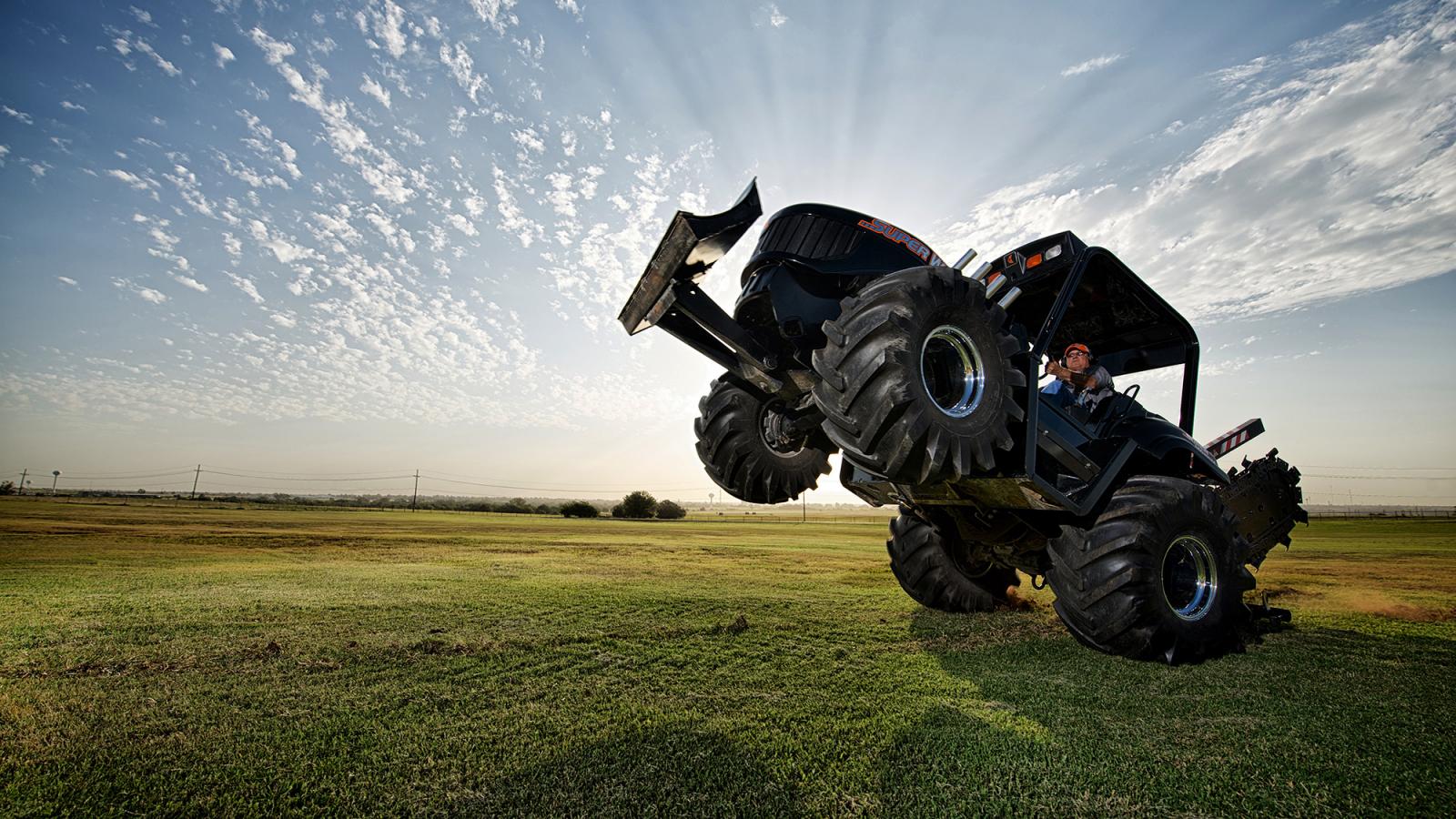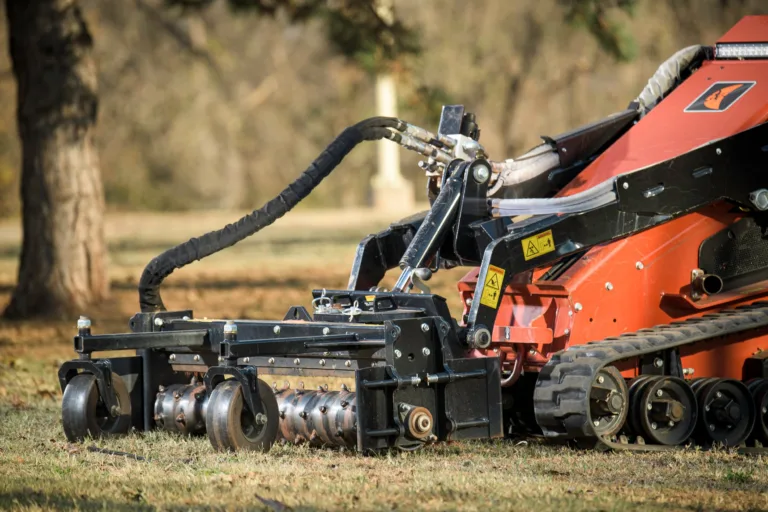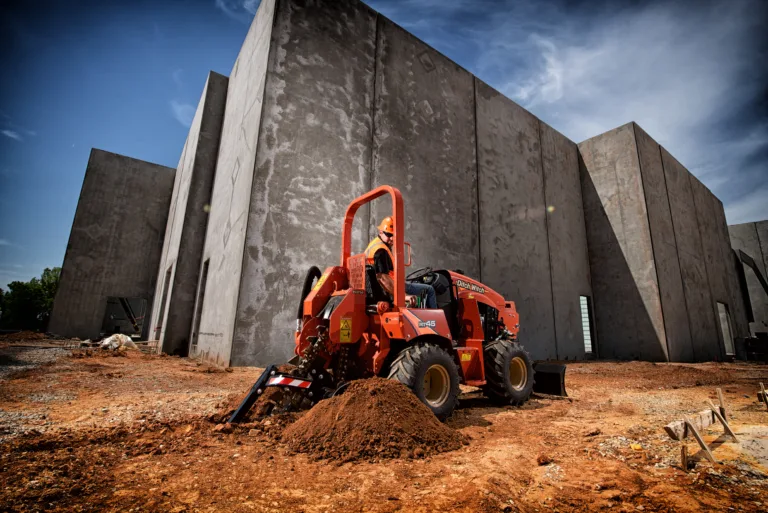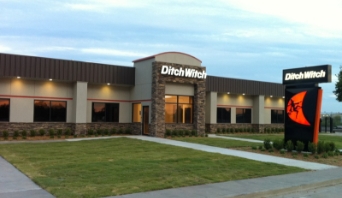As published in The Wall Street Journal.
Humans have been digging ditches for thousands of years.
Don Pemberton digs them just a bit quicker.
Instead of using hands and shovels, he climbs into a souped-up, hot-rodded, 850-horsepower machine that digs trenches at 100 feet a minute, five times as fast as a normal machine used by utilities and excavators.
The 67-year-old is the sole operator of the Super Witch, a one-of-a-kind trenching machine that looks and sounds like a large chain saw on wheels. Equipment maker Ditch Witch uses it as a marketing and promotional tool to sell more-practical versions of the machine.
The Super Witch makes appearances at industry trade shows, dealership openings, parades and factory tours. When it roars, spectators come running with their phones out to see it do wheelies and rip-up dirt.
“It would deafen you if you don’t have hearing protection on,” said Pemberton.
Pemberton is getting ready to hand over the controls. His coming retirement is causing a lot of stress for Ditch Witch executives. They are having a hard time solving a big hiring problem: how to replace its most famous ditch digger.
Will the Wienermobile of trenching equipment have to be mothballed?
The saga of the retiring Super Witch operator is just one example of the millions of jobs that will need to be filled as baby boomers retire in the years ahead. The median age of a manufacturing worker is 44 and more than a quarter of their workforce is 55 and older.
Ed Malzahn developed the original Ditch Witch trencher in the 1940s at his family’s machine shop in Perry, Okla., to help construction workers lay water, electric, gas and sewer lines to single-family homes.
The company boomed as America’s suburbs were developed. In 2019, it was purchased by Toro, the maker of lawn mowers and construction equipment, for around $700 million. More than 1,300 workers make the Ditch Witch and other products at the factory in Perry, which has a population of around 4,500.
The Super Witch was developed by rogue employees during their off hours, according to company lore. The original made its debut in the late1970s and has been upgraded multiple times, with the Super Witch VII starting service in 2013.
Pemberton himself started at the company in 1978, and has been driving the Super Witch for nearly 40 years. His day job is maintaining the company’s fleet of trucks and cars that are used for delivering products and visiting customers. But it’s the Super Witch gig that has made him a trenching celebrity—and a face of the company’s brand. Pemberton accompanies the Super Witch wherever it goes and people call him directly to schedule shows.

He has missed many family gatherings, especially in the busy spring and fall seasons. “My wife always enjoys it,” he joked. One year, Pemberton arrived at a location about 20 hours away from home, only to discover that his son’s high school graduation was imminent. He ditched the Witch and hopped onto a plane, making it back about 30 minutes before the ceremony.
Executives are trying to figure out how to formalize a job that grew over the decades based on the experience and tendencies of one star employee. Is it a full-time job or just 20% of someone’s time? Should there be two operators? Who can take a few weeks off to perform at trade shows and dealership openings around the country?
Potential candidates have taken the Super Witch for test rides around the company’s Perry campus. Many have struggled to learn how to run the oversize machine, which can be dangerous to spectators if the operator loses control.
“It was like a bucking bronco,” said Jeff Smith, a 51-year-old contender for the job.
Don’s own 36-year-old son, who was being groomed for the role, turned down the position.
“I had planned on him taking over,” said Pemberton. “He’s not going to do it. I’d have to babysit and run his cows.”

In addition to its succession planning, Ditch Witch is trying to come up with more ways of spreading Super Witch lore beyond Perry, where kids have been known to dress up as Super Witch operators for Halloween and a model-toy version made years ago has become a collectors’ item. One possibility is to have a colorful trailer that both transports the Super Witch and then converts into a storefront with swag, just like at Nascar races.
“Everyone within 50 miles of this place knows about this,” said Sean Hubbard, the marketing communications manager.
“We are trying to get it on a bigger scale, think Macy’s Thanksgiving Day Parade.”
The company launched a virtual-reality game this year to attract the next generation of operators. Players put on headsets and try to drive the hard-to-control Super Witch through floating company logos. 20 points gets you a T-shirt. At the Utility Expo in Louisville, which drew more than 20,000 construction and utility workers, Pemberton climbed into the 30-year-old Super Witch IV, brought out of retirement to commemorate his last few rides. As the crowd started to gather, he turned it on and revved up the engine. But something sounded off. He canceled the show.
“If you hit a rock, you can throw it 30, 40 feet. We try to make sure we aren’t going to hit a customer standing around,” said Pemberton. “I’ve been on it so long it becomes like riding a bicycle your whole life. You probably take chances you shouldn’t take. It’ll probably take some time to get comfortable around a crowd in a small area.”
It turned out there was rust in the engine that had come loose during transit. The afternoon show was canceled.
After cleaning the gas tank and replacing the filter, he was able to get the machine running again.
Pemberton climbed in the tractor-looking piece of equipment, buckled his seat belt and revved the engine. Heads turned and the crowd swelled. He backed down the dirt embankment it was parked on and started doing wheelies across the fenced-off show grounds, stopping before he hit fences and spectators. After a few minutes, he pulled back into the dirt pile and turned on the trencher.
“It ran pretty good. We did pretty good wheelies with it,” he said.
Pemberton was wistful about turning over the keys to somebody else, admitting, “It’s just hard to let go.”






